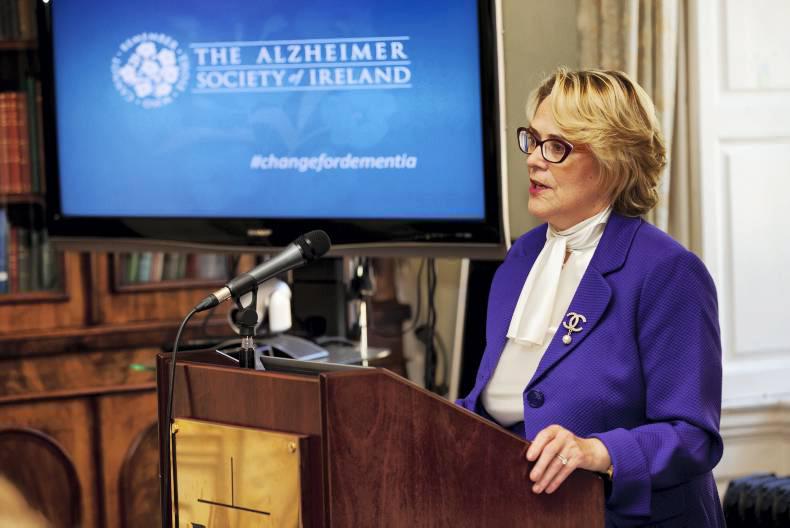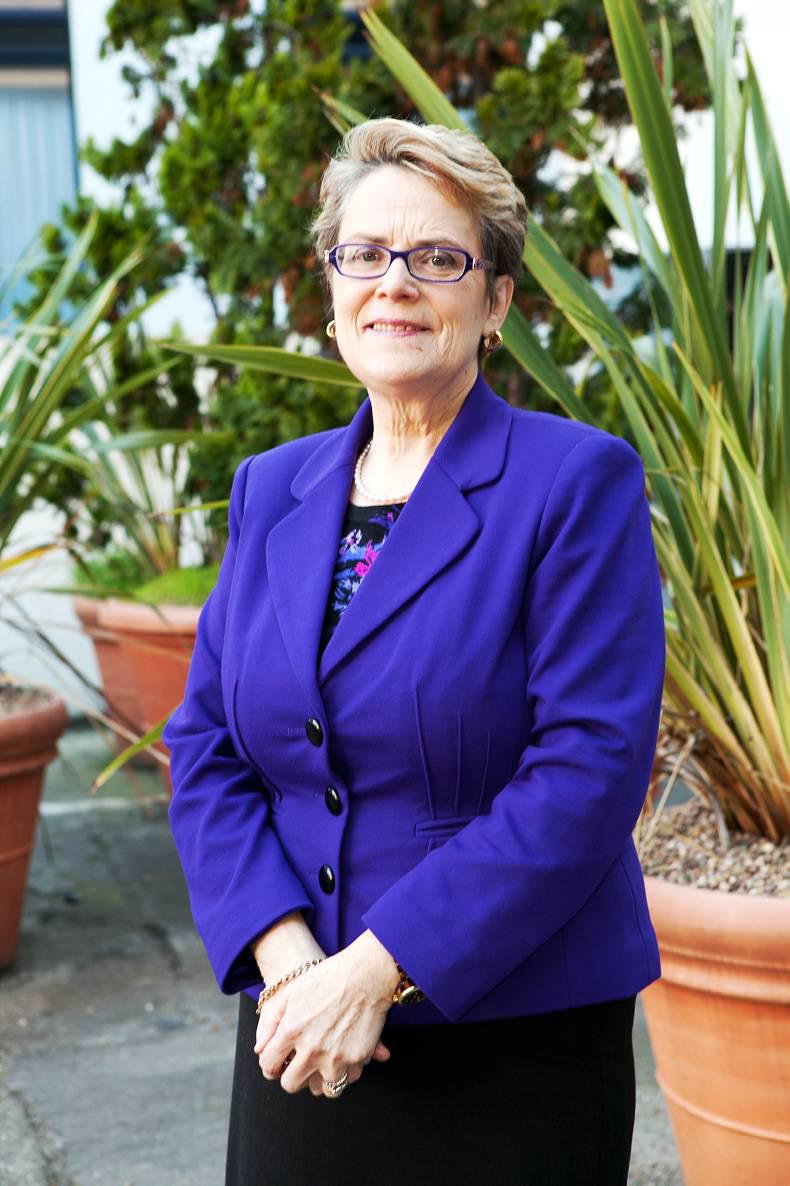Helen Rochford Brennan from Tubbercurry, Co Sligo, was always busy. She had worked at senior executive management level abroad for many years and in the tourism and disability sectors here after that. She was chair of a state agency when she was diagnosed with dementia in 2012.
“Prior to diagnosis, I experienced slow thinking and had difficulty retaining information,” she says.
She can still remember occasions at meetings when the words she needed just wouldn’t come out.
“It’s very difficult. You can see people looking at you and you are desperately trying to focus on the next sentence. I was also forgetting things my husband or son had told me which was frustrating for them and for me. Nothing was simple anymore. Everything was worrying.”
Helen spent many sleepless nights thinking about what was wrong with her and retired early because she was feeling so sluggish.
“I still wanted to contribute to society so I thought I’d sit on committees. I was hoping I’d get some clear thinking to return, but nothing changed. The days were endless.”
Helen was then referred to a specialist by her GP.
“I went through a lot of neuro-psychological testing. I thought the tests looked easy but then I realised I wasn’t able to remember or repeat sentences five minutes later.”
Diagnosis soon followed.
“Dementia. The word alone – the image of it, it was too much to bear. I don’t remember telling my husband and son but I remember the pain of that conversation. Back then there was nowhere to turn, no general supports. Here I was at 62 and the world had just closed in.”
LIKE BEING IN A BLACK TUNNEL
Helen describes that post-diagnosis period as like being in a black tunnel.
“It was the darkest period of unbelievable grief that one could imagine,” she says, “a time when I isolated myself.”
Eventually she availed of the support of the Alzheimer Society of Ireland where she was advised to tell people of her illness. She stepped down from all the committees she was on following diagnosis.
“There was a great expression of sadness from everyone. They looked at it as I did, as an illness for an older person. How could it happen to someone younger?”
Helen then got involved in research into cognitive rehabilitation. Cognitive rehabilitation taught Helen skills like keeping a diary and a whiteboard to manage her day.
“I constantly took notes (and still do) and tried to create a new life beyond dementia. I started walking again and tried to set up a routine in my day where before all I could see was doom and gloom. Over time I learned to handle the illness better and not let it define me as a person.”
OUTRAGED BY LACK OF SUPPORT
Three years ago, Helen didn’t want to leave the house. Now she travels all over Europe with assistance and is an advocate for those with dementia.
“I think of Mother Teresa and of how my life has changed now and the advocacy work I do. She said: ‘I can’t change the world but I can cast a stone across the waters to create many ripples.’ I want to create ripples, fight for better services for those with dementia.”
Helen was outraged by the lack of support for those with the illness.
“All my life I’ve been fighting for human rights and then all of a sudden my own basic rights were not being met. I want to help bring dementia out of the shadows, get people talking about it, even younger people.
“I was 62 when I was diagnosed but there are people in Ireland in their 40s and 50s, mums and dads being diagnosed, people who have a young family, the sole breadwinner in many cases. So, it’s important that we get people talking and that those with dementia really do get what’s required to live a fulfilled life in the community.”
48,000 people in Ireland are living with dementia now and 63% of those live in their communities. Approximately 4,000 are under the age of 65.
“We need to have proper supports to live at home. We need access to dementia advisers. The Alzheimer Society of Ireland has got advisers but not in every county. They are needed in every area.
“Such services didn’t exist when I was diagnosed and to be honest there would have been so much less pain in my life if there had been.”
IF WE HAD CANCER IT WOULD BE SO DIFFERENT
“If we had cancer it would be so different. We would have all sorts of supports but because we have an illness that is described as the new cancer there are no supports. We need to be supported as much as possible to stay at home for as long as possible.
“Dementia is the most serious health challenge facing Ireland. We need ring-fenced funding for it. At present, the funding is centred on nursing homes. When you have contributed and paid your taxes and feel frustrated by the lack of supports you get very exasperated and that impairs your memory.
“Right now, 48,000 are living with dementia. That number, by the end of the next government in 2021, will be increased by 40%.”
DRIVING AND DEMENTIA
Helen would like to make this point about dementia and driving: “People think those with dementia shouldn’t be driving. I have to do a driving assessment every year. I think it’s important that general public know that, that we are assessed. If you are assessed and you pass, you can drive. Being able to drive allows you to get out and have a better quality of life.”
>> Information
DEMENTIA - STAGES AND PROGRESSION
Each person’s experience with dementia is unique to them so how the disease will progress varies with each person. There is no way to say exactly how that will happen. The information below is only a guide.
Early Stage
• Forget things easily, repeat things.
• Stuck for words or losing track of a conversation.
• Find new situations/places confusing.
• Unwilling to try new things.
• Poor judgement and difficult to make decisions.
• Lose interest in people or activities.
• Experience low mood, may become anxious or withdrawn.
• Feel frustrated or angry.
Middle Stage
• Find conversations, TV or reading difficult or confusing.
• Find bathing and dressing difficult or confusing.
• Get lost easily, even in familiar places.
• Need reminders to eat, drink and take medication.
• Forget recent events completely.
• Find meal preparation and managing money very difficult.
• Believe things are real even when they are not.
• Feel restless or agitated.
• Confuse time and experience difficulties with sleeping.
Later stage
• Have difficulty recognising people although there may be flashes of recognition.
• Gradual loss of speech.
• Difficulty eating and swallowing.
• Experience incontinence.
• Appear restless and seem to be looking for something or someone.
services available
Samantha Taylor, information manager with the Alzheimer Society of Ireland: “If someone has received a diagnosis, the most important thing to do is to try and find out as much as possible about the dementia they have and how it is affecting them. That will help them identify the supports and services they need. Sometimes the supports will be very practical things like memory aids or technology or thinking about how they use exercise and eating well to help maximise their energy and live well day-to-day. Anyone with concerns should contact our free and confidential helpline to get more information. We also have a dementia adviser service where we arrange for someone to meet with you and talk through what’s happening and what’s available in your area.”
COGS CLUBS – new service
A new service, designed to help people newly diagnosed with dementia, will be piloted by The Alzheimer Society of Ireland in Galway from 8 February.
Cogs Clubs are weekly sessions for people with mild to moderate dementia. Providing five hours of social activity and friendship through a combination of cognitive stimulation, music, reminiscence and orientation. It will run every Monday from 10am to 3pm in Knocknacarra, Galway. Cost is €15. For more information, contact 086-7809-615
The Alzheimer Society of Ireland
The Alzheimer Society of Ireland is the leading provider of dementia-specific services in Ireland.
Their national helpline number is 1800-341-341. Open Mon-Fri 10am to 5pm and Sat 10am to 4 pm. Email helpline@alzheimer.ie. Visit their YouTube channel at https://www.youtube.com/user/AlzheimerIreland






SHARING OPTIONS